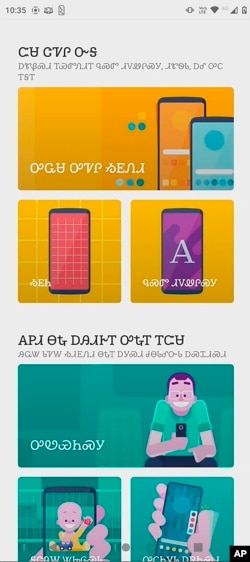The Cherokee are a large Native American tribe. Many live in Cherokee Nation, a huge reservation in the state of Oklahoma. Others live farther east, in places like North Carolina and Delaware.
The Cherokee language is considered endangered, or at risk of disappearing. The majority of people who speak the language are old. Recent efforts involving technology, however, might help speakers use the language more in daily life.
Last week, Motorola introduced a Cherokee-language operating system on its newest phones. Phone users will be able to find apps and explore settings using the written form of Cherokee. The system, or interface, will appear on the company’s Edge Plus phones when they go on sale this spring.
By itself, the Cherokee interface will not be enough to save the language. But it might be a step toward immersing younger tribal citizens in the language.
That is the hope of Principal Chief Richard Sneed, a leader of the Eastern Band of Cherokee Indians. The tribe is one of three federally recognized Cherokee tribes in the country. Sneed hopes that more inclusive technology will help keep the language alive. He and other Cherokee leaders spent several months working with Motorola to make the Cherokee language interface possible.
It is not the first time a technology company has offered the Cherokee language on their products. Apple, Microsoft and Google already offer users a choice to use Cherokee on computer keyboards. But the Cherokee experts who worked on the Motorola project said they tried to include the culture as well as the language.
For example, the start button on the Motorola phone has a word that, in English, means “just start.” It reminds language expert and Cherokee, Benjamin Frey, of how older tribe members speak.
“It could have said ‘let’s get started’ in many different ways,” Frey said. “But it said halenagwu — just start. And that’s very Cherokee. I can kind of see an elder kind of shrugging and saying, ‘Well, I guess let’s do it.’ ... It reminds me…of how the elders talk, which is pretty exciting.”
Frey is an American studies professor at the University of North Carolina at Chapel Hill.
Motorola had the goal of developing an interface in a language that is considered endangered. It also wanted to work with a language that has an active community of experts.
“We work with the people, not about the people,” said Juliana Rebelatto. She is chief linguist for Motorola’s mobile division. “We didn’t want to work on the language without them.”
Motorola designed its Cherokee project based on a similar Indigenous language project that Rebelatto worked on in Brazil. Frey and Sneed say they recognize that some Cherokee will have concerns about tech companies using their language.
“I think it is a danger that companies could take this kind of material and take advantage of it, selling it without sharing the proceeds with community members,” Frey said. But, to him the good the technology could do was worth that risk.
Frey did not grow up speaking Cherokee. That is partly because of his grandmother’s experiences as a child.
For more than 150 years, Indigenous children in the U.S. and Canada were taken from their communities and forced into boarding schools. The young people were barred from using their native language.
Frey’s grandmother and others of her generation were beaten for speaking the language. They were told that “English was the only way to get ahead in the world,” Frey said. Frey’s mother, as a result, did not learn Cherokee.
Only about 225 of the 16,000 members of the Eastern Band of Cherokee Indians spoke Cherokee as their first language at the start of the COVID-19 pandemic.
“Now I think we’re down to 172 or so,” said Sneed, the principal chief. “So we’ve lost quite few in the last couple of years.”
Frey hopes the new Motorola phone tool will be a conversation-starter between older Cherokee language speakers and their grandchildren. But he added that it will take more involved language efforts to really make a difference.
“If the youth today are watching TikTok videos, we need more TikTok videos in Cherokee,” said Frey. “If they’re paying attention to YouTube, we need more YouTubers creating content in Cherokee.
“We do have to make sure that the language continues to be used and continues to be spoken,” said Frey. “Otherwise, it could die out.”
I'm John Russell.
And I'm Ashley Thompson.
The Associated Press reported this story. Ashley Thompson adapted it for VOA Learning English.
Words in This Story
reservation - n. an area of land in the U.S. that is kept separate as a place for Native Americans to live
immerse - v. to make (yourself) fully involved in some activity or interest
keyboard - n. the set of keys that are used for a computer or typewriter
button - n. a small area on a computer screen that you click on to make the computer software do something
linguist - n. a person who studies linguistics (the study of language)
indigenous - adj. produced, living, or existing naturally in a particular region or environment
(take) advantage (of) - n. to use (something) unfairly for personal gain
proceeds - n. the total amount of money or profit that is made
conversation - n. an informal talk involving two people or a small group of people : the act of talking in an informal way






